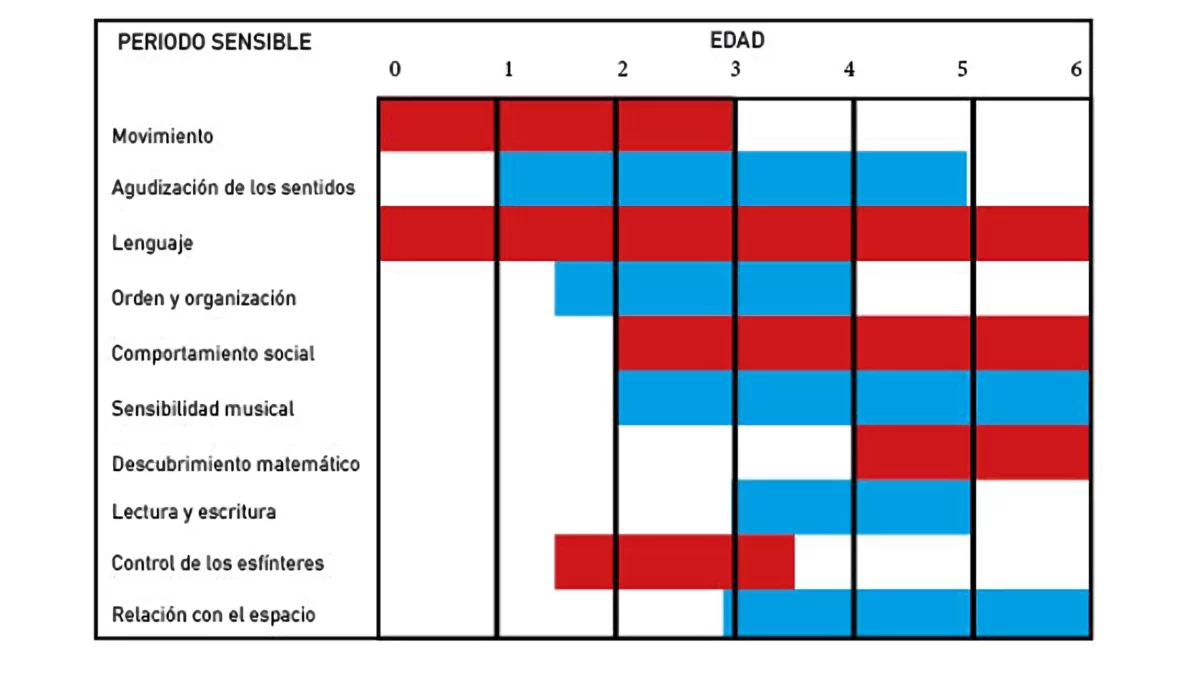Being informed of what we can expect while raising children between 1 and 3 years old, regarding their development, how their mind and emotions are working, helps us to empathize and connect better with them.
Raising children between 1 and 3 years old is a challenge for both new and experienced parents. It is a period of ups and downs, change after change and above all a lot of experiences full of love, tenderness and fun.
In the Montessori philosophy, we talk about sensitive periods, windows where learning can develop in a better way, but they do not have an exact moment and should not be taken as a goal to be met. Sensitive periods help us as guides to be able to identify, through observation, at what point in a stage our children show their natural interest in developing an important skill for their interaction with their environment.
From 0 to 3 years old, these learning windows are mainly linked to movement, knowledge of themselves and their environment, and the development of communication.
Until the age of 3, their neurons not only multiply like at no other time in life. They also connect with each other, forming a dense network through which nerve impulses pass. His mind is amazing since he has the ability to live happily while learning a language with its grammatical complications. Namely, all knowledge enters his head for the simple fact of living.
What Maria Montessori called "the absorbing mind": the little one learns everything unconsciously, passing little by little from the unconscious to the conscious, going through a path in which everything is joy and love.

What can we expect from children between 1 and 3 years old?
- That there is a marked egocentrism, which is not negative. It is necessary for them to structure the meaning of "I" and for them to recognize their environment through themselves. That is why they have a greater natural understanding for what they know belongs to them, what is "theirs" compared to the acceptance of what belongs to others (a distinction that is especially challenging for them when set against the intense feeling of desire ).
- A social and emotional development of the child full of contradictions.
- What your emotions are constantly overflowing, the so-called "tantrums" are nothing more than the process of self-control and emotional management that require our guidance and accompaniment. It is the best time to provide them with quality tools that help manage their emotions in the best way according to their age.
These overflows are the expression of an unsatisfied need that creates a state of tension. When we are able to identify, understand and satisfy these reactions, calm returns. Respecting the child's sensitive periods is therefore essential. - What oscillate between sociability and attachment. There will be days when it's exciting to interact with other people and days when they just want to stay close to your lap.
- What your emotions are constantly overflowing, the so-called "tantrums" are nothing more than the process of self-control and emotional management that require our guidance and accompaniment. It is the best time to provide them with quality tools that help manage their emotions in the best way according to their age.
"To be an independent and secure adult, he must have been a dependent, attached, supported baby, in short, LOVED"
sue gerhardt
- That they be repetitive, both in language and in activities: practice makes perfect. Also you can expect regressions in behavior, situations that you already thought were overcome return (especially between the ages of two and a half and three).
- You need an enormous amount of physical activity, since the development of your thick and thin muscles is exponential. They are not restlessYour body needs and asks for movement!
What are the sensitive periods of the year at three years?
This concept was developed by the prestigious Italian educator Maria Montessori, who turned to Biology –and specifically– to the analysis of the behavior of some insects. Observing the growth of the caterpillars, Montessori observed that they had a special sensitivity to sunlight, which forced them to feed exclusively on green shoots. After this period, the caterpillars lost that sensitivity and began to feed differently.
“A child learns things in sensitive periods, which could be compared to a lit lighthouse that illuminates internally, or to an electrical state that gives rise to active phenomena. This sensitivity allows the child to come into contact with the outside world in an exceptionally intense way. And then everything is easy for him, everything is enthusiasm and life. Each effort represents an increase in power. When, in the sensitive period, he has already acquired some knowledge, the torpor of indifference sets in, fatigue."
Maria Montessori.
The example that best helps to understand the magnitude of the sensitive periods is the acquisition of language. Children show a great interest, from a very young age, in observing the mouth of the person who speaks to them, and later, in knowing words, repeating the same story or humming the same song... After the first two years of absorption, in the that we could say that they have remained almost silent, are able to communicate accurately reproducing both the sounds and the grammar and syntax of the language they have heard. But if the child has not been able to act according to his sensitive period, the opportunity for a natural conquest will have been lost.

How can we accompany the sensitive periods of our children between 1 and 3 years old?
Through an attitude of openness, respect, empathy and acceptance.
We must start from the premise that each one of us is unique. Thus we will understand that even among siblings, children will not have the same tastes or interests, nor will they have the same reactions to environmental stimuli; and it is that each human being perceives in a different way the light, the sounds, the smells, the heat, the cold, the physical contact...

Here are some clues that will help you detect sensitive periods according to Montessori:
- The child has minutes of spontaneous concentration with that activity
- The child repeats that activity for no apparent reason
- During consecutive days he is interested in that aspect, he dwells on it
- Find that aspect in places or times that you would not have thought of (for example; Tidy up a room outside of your house)
Observation and intuition will help you detect those precious little windows of opportunity and once there flow into them, it is a gradual conquest in which the task of the adult in charge of caring for the little one is to guide their progressive acquisition, always remembering that it is his personal process. Due to outdated beliefs we may think that the more help we provide them or even doing things for them will give them a better opportunity in the future, but nothing is further from the truth. the greater our interference, the more your progress will be hindered.
The child, through the game, will achieve physical and communicative independence, to later conquer the independence of thought, will and morality. The game is and will be the main channel for learning, growth and knowledge.
Remember that in the Millaray Montessori School we are all a team. If you have a child between 1 and 3 years old and would like to receive more advice and support to detect the sensitive periods that are latent in your little one, do not hesitate to approach your Montessori guide.
